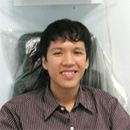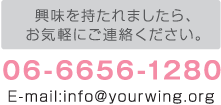the Way Into the New Generation! W.I.N.G!
Comments of past participants

Patrick Alejo
From May 7, 2009 until February 28, 2010
When I first came to Japan, probably just like most foreigners who come here, I had planned on teaching English, and basically that's what I did at the beginning. I found, however, that teaching English all day left me with little time to learn Nihongo, so I started searching for new employment, and in the process found a irreplaceable life experience. I cannot sum up into words just fulfilling it is to come to work everyday, and make someones life happier, and a little easier.
The clients who make use of the facilities are great people, who you will quickly consider friends soon after you begin working at W.I.N.G.. People of different nationalities, personalities, beliefs, religions etc. will find a home here, because helping others almost always creates a nice feeling in a persons heart (unless of course your evil......)
If all of that does not swing your fancy.. then refer to the statement in brackets... joudan dake :) Seriously my Nihongo was atrocious before I started working here, and actually it still needs work :), but now I don't make unintentional insults with every sentence I say for example:
Anata no imouto ikura deska = punch to face
Anata no imouto ikutsu deska = she‘s 20 :)
If your going to Japan you should at least know why I would get punched, if not.... please study more, for your own good. If that still is not enough, then I can say the pay is pretty nice :) I look forward to seeing you all.

Daniel Marks
From August 8, 2008 until July 31, 2009
I worked full time in Momo-branch for seven months, and then transferred to Yume-branch for a further four months working part time in their office, so I got to see a few sides of the job. I found the full time working week to be quite physically challenging, and frustrating at times, but I also learned to challenge myself, and I am satisfied that I gave my all to it. At Yume-branch, my main role was to draft a handbook for future working holiday makers, and it was nice to be able to put the knowledge I gained at Momo-branch to practical use in this way. Right at the very start of working for WING, I said to myself, 'My true wages are the smiling faces of the service users', and I think that's still very true.
Feel free to contact if you have questions: jibenainosai@yahoo.co.uk

Daniel Weisman
If you are reading this, something about the ad has probably caught your eye and you are trying to figure out exactly what working at WING is like. It's hard to find the right words to sum up a year of experience in a brief composition, but I hope you'll bear with me because I don't think you'll regret it.
At this point, I understand you're looking for jobs and probably living in an expensive country like Japan, your primary and most urgent worry at this point in money. However, I think you should ask yourself what you came to this country to do? Was it for money? Was it for something else?
Personally, I came to Japan to learn more about the country, the people and all the things that were going on here. I also went to try and learn more about myself in the process. Of course, learning Japanese is an added benefit.
Let's get the advantages out of the way first so we can get into the details of job later. When I first came to Japan, I couldn't have a conversation in Japan, I knew a couple random words and some basic Japanese grammar but nothing significant in any way. These days, I read at maybe a 5th grade level and most of my conversations with Japanese friends take place completely in Japanese. I'm not as good as a person who was born in Japan, but I promise you if you work there for a year, there will be few non-Japanese people who can speak Japanese quite like you do. And on top of that there will be even fewer gaikokujin (Foreigners) who can speak Kansai-ben quite like you. Kansai dialect is probably the hottest and coolest accent you could have and I promise you it will come in handy.
On the financial issue, I had enough to travel to basically every prefecture in Japan including Okinawa. I had enough to do a third of the 1300 km walking pilgrimmage in Shikoku and I had enough to hitchhike around Kyushu and Hokkaido. Just to mention a couple things.
I also made connections with people in Japan that I will never forget. Getting to understand and experience the holidays and really proceed past and far beyond the typical "soto-uchi" (Outside-Inside) mentality of relationships that you may have in Japan. You will probably have few chances to experience Japan quite like this.
Some things I should mention in advance: if you just don't like people, you might not like this job either. If you are unflinching and very stubborn, you may not find this job as rewarding as someone who approaches it with flexibility and an open-mind.
I learned a lot about respect and community while I worked there and also learned about taking care of people while still appreciating that they are your equals and deserve the respect of being treated that way.
In terms of the job itself, you will have to do something you probably have experienced before (and other things you have not). You will have to take people's temperatures and likely feed them too. You will also have to pretend you like karaoke and go along with it at times. You will likely wind up bathing a person once or twice a week. You can participate in roll call in the morning if you want or at least acknowledge you are conscious at the time. You will be bombarded with questions for the first couple days and people may take a deep interest in you beyond that, but once you survive that, you'll be in the clear. You undoubtedly will have to change diapers at some point. Although it was surprisingly to me at first, being only a 19 year old University age Canadian at the time, it didn't really bother me and you get used to it quickly, its 30 seconds out of your day. You will also get to go on a lot of outings to places you wouldn't normally see and chances are you will get to know your co-workers very well, sometimes better than you wanted to. Japanese names can be difficult until you get used to them, but people will be considerate of your situation and some of them speak English (though I personally made a point of trying to speak in Japanese).
The day is remarkably relaxed with the exception of lunch and when everyone leaves and you will have a lot of time to play around with everyone.
I can tell without a doubt in my mind that if my working-holiday visa hadn't run out I would likely still be working there today.
If you have any questions at all, it would be my pleasure to answer them. From someone who has run the gauntlet himself, I wish you all the best of luck with job searching even if this job isn't for you.
My e-mail is kanarazu@hotmail.com and though I can't promise a swift reply, I do promise a considered and thoughtful one.






